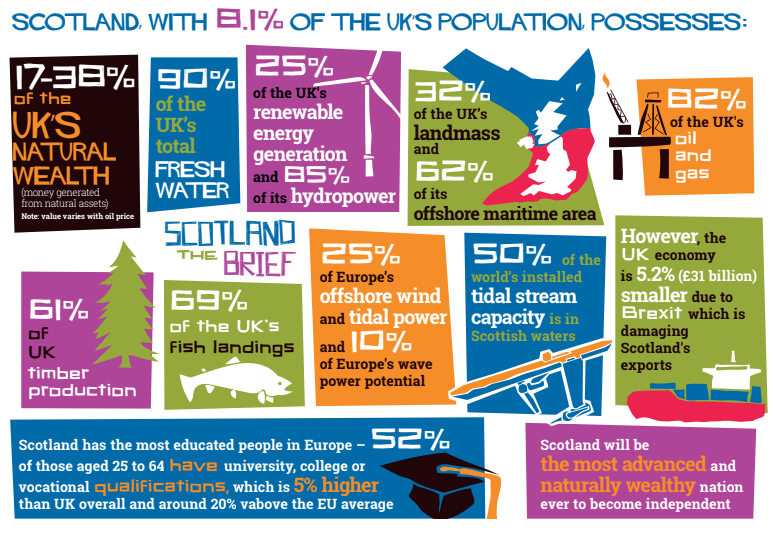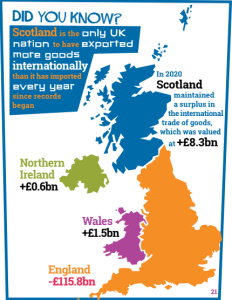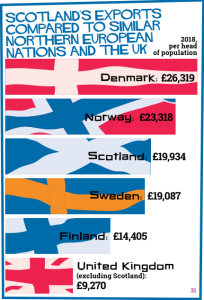A major bonus for any nation’s economy is the ability to export specialised manufactured goods. This is one of Scotland’s key strengths.
In highly developed economies such as Scotland’s, it takes technological advantages or natural wealth to develop the specialisms that create high-value export demand and higher prices. This, in turn, creates new jobs of a higher quality that pay higher wages than would otherwise be the case. So, let’s take a look at Scotland’s export performance.
Scotland is an exporting powerhouse and possesses several significant advantages when it comes to developing those specialisms. For example, our unspoilt green and mountainous scenery and its lochs, glens and rivers transfer a perception of significant natural value to our food and drink exports. 60% of our seafood landings are exported 13 and Scotch whisky, which can only be produced in Scotland, accounts for 22% of the whole of the UK’s food and drink export trade with 44 bottles of Scotch exported every second. 14 International exports from the food sector have also grown by 81.6% since 2007. 16
Oil and gas exports are also performing well. Adding to this, Scottish oil and gas supply chain companies have been winning contracts abroad, exporting their world-leading expertise. In 2018/19, which is when the most recently available data was published, oil and gas supply chain company exports amounted to £3.7bn 17, almost matching the £3.8bn from Petroleum Coke and Petroleum exports. 18
So how does Scotland’s performance compare with other nations? Examining the data on international exports of goods for all the UK nations, produced by HMRC, we see that Scotland is the only UK nation to have internationally exported more goods than it has imported every year since records began. In the last few years Northern Ireland has generated a surplus in goods but persistently operated a deficit in the past. England and Wales have run persistent deficits. England always runs persistent deficits in the international trade in goods.
A surplus in international exports of goods is a key strength of Scotland’s economy but how does that comes to other medium sized Northern European nations (and indeed the rest of the UK)?
Scotland’s exporting success runs contrary to the UK’s performance as a whole. Indeed, Scotland has achieved its success despite major container ports being mothballed after privatisation. This means almost all of its exported goods suffer the added difficulty of needing to travel through England to be exported, creating what is known as export friction. Notably, the most recent summary of exports found that the total value of manufactured goods exported by Scotland to the EU and the rest of the world was higher than the value of manufactured goods exported to the rest of the UK, at £19bn compared to £11bn. 19
Scotland has a hugely positive reputation for quality, natural beauty, history, natural resources, expertise and technological innovation and for high-quality specialty products such as Scotch whisky. It is this reputation for premium products that international buyers perceive, on Scotland’s beef, salmon and seafood in particular, that drives Scotland’s exporting success.
The most recent data, which refers to 2018, suggests that Scotland’s exports per head versus the rest of the UK (rUK) are £19,934 (including oil and gas) per year for Scotland 22, versus a staggeringly low £9,270 for rUK. 23 Scotland’s exports in goods are more than twice the UK’s on a per head basis, clearly demonstrating that Scotland is an exporting nation while rUK is an importing nation.
Scotland’s international exports support more than 300,000 Scottish jobs. 24 For every 100 jobs supported by exporting, an additional 66 jobs are supported through spill-over benefits to the Scottish economy. 25
In 2019, international exports accounted for 21% of Scotland’s economy, or Gross Domestic Product (GDP). 26 The Scottish Government has announced a plan to increase that to 25% in the next decade, which would create 17,500 new jobs. 27 This would add 2% to the economy and generate roughly £500m in additional Scottish Government revenues per year. 29
Denmark sets the gold standard in exports and so is clearly a nation that Scotland needs to aspire to match in the medium-to-longer-term. It is worth noting that Denmark does not even come close to having the natural wealth, or as broad-based an economy as Scotland enjoys. Achieving a greater exporting ratio per head than nations such as Finland and Sweden and being close to Norway is a significant result for Scotland.
The rest of the UK’s and especially England’s international trade deficit in goods is massive and with the chaotic aftermath of Brexit and increased economic instability, it is likely that the UK trade deficit will continue to worsen. It is also probable that the dominance of London’s finance sector will continue to diminish. In November 2022, the value of the Paris Stock Exchange overtook London’s for the first time in history. 35 This would have a knock-on, detrimental effect on its ability to compensate for England’s poor trade figures through a surplus in international financial transactions.
When it comes to exporting, Scotland has many vital advantages and significant untapped potential. However, the effect of Scotland’s ports closing has meant that goods are forced to travel further to be exported. That, combined with the new dangers of Brexit, means that Scottish exports and the Scottish economy are far more likely to thrive with the bespoke policies and attention they would receive in an independent Scotland, particularly if Scotland rejoins the EU.
You may also like: Scots exports would be worth almost £100bn after independence
Exporting Notes and References










[…] Scotland is a leading exporter – exporting over £6000 of goods per head more than the rest of the UK. One of the key benefits of Scotland’s membership of the EU is ease of access to the Single Market. […]